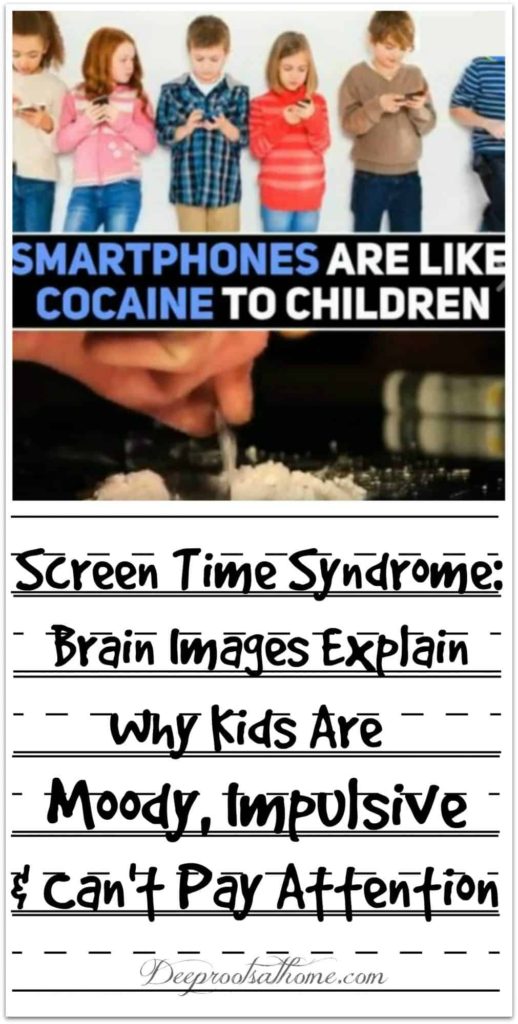Originally published by Kettle Moraine Publications on another site on June 7, 2018. ~ Ed.
Screen time, in its multiple forms, will be part of your children’s lives at some point. But parents must ask themselves how early and to what extent?
 AN EDUCATIONAL EDGE?
AN EDUCATIONAL EDGE?
Some parents think they’re giving their child an educational edge like Susan who bought her 6-year-old son John an iPad when he was in first grade. She thought, ‘Why not let him get a jump on things?’ John’s school had begun using the devices with younger and younger grades – and his technology teacher had raved about their educational benefits.
Dr. Nicholas Kardaras, one of the country’s foremost addiction experts who counseled Susan and her son John, writes, “She started giving John screen time to play different educational games on his iPad. Soon, he discovered Minecraft, which a teacher assured was “just like electronic Lego.” She remembered how much fun she had as a child building Legos. At first, Susan was pleased. John seemed engaged in creative play. She did notice that the game wasn’t quite like the Legos she remembered – after all, she didn’t have to kill animals and find rare minerals to survive and get to the next level with her old game. But the school even had a Minecraft club, so how bad could it be?”
“John became more and more focused on his digital game, losing interest in baseball and reading while refusing to do his chores. As his behavior continued to deteriorate, Susan tried to take the game away but John threw temper tantrums. His outbursts were so severe that she gave in, still rationalizing to herself over and over again that “it’s educational.”
But it’s even worse than we think.
DOSE OF REALITY
There’s a line; cross it and parents may actually unintentionally be doing significantly more harm than good.
“Tablets are the ultimate shortcut tools: Unlike a mother reading a story to a child, for example, a smartphone-told story spoon-feeds images, words, and pictures all at once to a young reader. Rather than having to take the time to process a mother’s voice into words, visualize complete pictures and exert the mental effort to follow a story line, kids who follow stories on their smartphones get lazy. The device does the thinking for them, and as a result, their own cognitive muscles remain weak.” ~ Liraz Margalit Ph.D
Digest the information below on screen time, even though it might feel uncomfortable, and arm yourself with the truth about the potential damage screen time is capable of imparting – particularly in a young, still-developing brain.
“There’s a reason Steve Jobs was a conscientiously low-tech parent. Silicon Valley tech executives and engineers enroll their kids in no-tech Montessori or Waldorf schools. Google founders Sergey Brin and Larry Page went to no-tech Montessori Schools, as did Amazon creator Jeff Bezos and Wikipedia founder Jimmy Wales.” (Source)
SCREEN TIME, A DIGITAL DRUG
We now know that smartphones, iPads, and Xboxes are a form of digital drug. Recent brain imaging research is showing that they affect the brain’s frontal cortex – which controls executive functioning, including impulse control – in exactly the same way that cocaine does. Technology is so hyper-arousing that it raises dopamine levels — the feel-good neurotransmitter most involved in the addiction dynamic – as much as sex.
Victoria L. Dunckley M.D says, Too Much Screen Time Damages the Brain.

Source: Lin, Zhou,Lei, et al. Red areas designate abnormal white matter in internet addicted kids.
But what about kids who aren’t “addicted” per se?
Let’s be clear!
Even in children with “regular” exposure, we should be aware that screen time is creating subtle damage considering the “average” child clocks in more than seven hours a day (Rideout 2010).
As a doctor, Dunckley observes that many of the children she sees suffer from sensory overload, lack of restorative sleep, and a hyper-aroused nervous system, regardless of diagnosis—what she calls electronic screen syndrome. These children are impulsive, moody, and can’t pay attention – much like the damage seen in these scans above. (Source)
WEANING AND RETRAINING
Unfortunately, screen time has replaced the outdoor time and become a kind of babysitter. Children used to play outside, where, in unstructured natural environments, they learned and practiced their social skills.
And like the story of Susan and her son John, we need to get our children back to playing with Legos and toys that don’t think for them!
Scientist know we can train and retrain the brain. It is moldable. Through our environment, we can make the brain weaker or make it stronger. Despite everything we might think is good – like electronic ‘educational’ games – we have unfortunately remolded our children’s brains in the wrong direction.
We can rewire and retrain the brain by being intentional. It’s so much easier to start young!
Victoria Prooday, OT writes:
1. TRAIN DELAYED GRATIFICATION
* Make them wait!!! It is ok to have “I am bored“ time – this is the first step to creativity
* Gradually increase the waiting time between “I want” and “I get”
* Avoid technology use in cars and restaurants, and instead teach them waiting while talking and playing games
2. DON’T BE AFRAID TO SET THE LIMITS. KIDS NEED LIMITS TO GROW HAPPY AND HEALTHY!!
* Make a schedule for meal times, sleep times, technology time
* Think of what is GOOD for them- not what they WANT/DON’T WANT. They are going to thank you for that later on in life.
* Limit constant snacking. Parenting is a hard job.
3. TEACH YOUR CHILD TO DO MONOTONOUS WORK FROM EARLY YEARS AS IT IS THE FOUNDATION FOR FUTURE “WORKABILITY”
* Folding laundry, tidying up toys, hanging clothes, unpacking groceries, setting the table, making lunch, unpacking their lunch box, making their bed (Source)
4. HAVE FUN WITH YOUR CHILDREN
* Read aloud, wrestle with your kids, make a Mexican or Italian meal together, do a family game night or a treasure hunt in the house or yard. Push the table aside and dance with them, laugh about what they did when they were really little, take walks and look at the clouds! (Source)
“Kids will change when parents change their perspective on parenting. Help your children succeed in life by training and strengthening their brain sooner rather than later!” ~ Victoria Prooday
Remember, parenting is about progress, NOT about perfection! You are reading about this because you are a parent who wants to do all you can to help and advance your child in the right direction.

You can do it!!
Written by Jacqueline and published by Deep Roots at Home ~ October 9, 2017
 FAIR USE NOTICE: This site contains copyrighted material the use of which has not always been specifically authorized by the copyright owner. We are making such material available in our efforts to advance understanding of environmental, political, human rights, economic, democracy, scientific, and social justice issues, etc. We believe this constitutes a ‘fair use’ of any such copyrighted material as provided for in section 107 of the US Copyright Law. In accordance with Title 17 U. S. C. Section 107, the material on this site is distributed without profit to those who have expressed a prior interest in receiving the included information for research and educational purposes. For more information go to: http://www.law.cornell.edu/uscode/17/107.shtml
FAIR USE NOTICE: This site contains copyrighted material the use of which has not always been specifically authorized by the copyright owner. We are making such material available in our efforts to advance understanding of environmental, political, human rights, economic, democracy, scientific, and social justice issues, etc. We believe this constitutes a ‘fair use’ of any such copyrighted material as provided for in section 107 of the US Copyright Law. In accordance with Title 17 U. S. C. Section 107, the material on this site is distributed without profit to those who have expressed a prior interest in receiving the included information for research and educational purposes. For more information go to: http://www.law.cornell.edu/uscode/17/107.shtml
